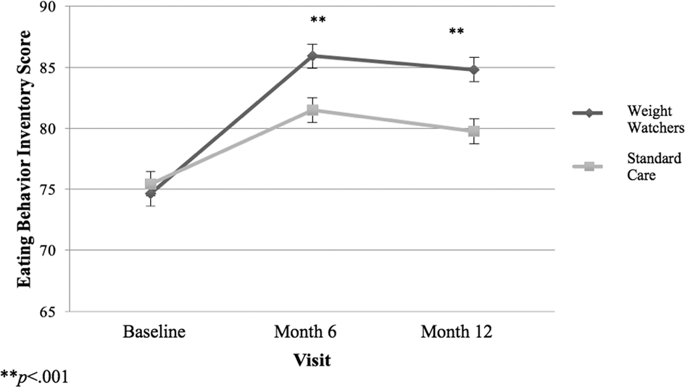International Journal of Obesity ( IF 4.2 ) Pub Date : 2020-01-16 , DOI: 10.1038/s41366-020-0530-x Erica M Schulte 1 , Peter W Tuerk 2 , Thomas A Wadden 3 , W Timothy Garvey 4, 5 , Daniel Weiss 6 , Kathie L Hermayer 7 , Louis J Aronne 8 , Lynne E Becker 9 , Ken Fujioka 10 , Karen Miller-Kovach 11 , Robert F Kushner 12 , Robert J Malcolm 1 , William J Raum 13 , Stephanie L Rost 11 , Domenica M Rubino 14 , Nicoleta D Sora 7 , Jan L Veliko 11 , Patrick M O'Neil 1

|
Background
A WW (formerly Weight Watchers) program adapted for persons with type 2 diabetes mellitus (T2DM) previously was found to be more effective than standard care (SC) intervention for weight loss, improved glycemic control, and weight- and diabetes-related quality of life measures. With data from the same national trial, this study examined whether WW adapted for persons with T2DM also increased engagement in weight control behaviors and decreased hedonic hunger, each of which could contribute to improved diabetes management.
Intervention and methods
Individuals with T2DM (n = 563) and overweight or obesity participated in a 12-month, 16-site, randomized trial of WW with diabetes counseling or SC. Hierarchical linear modeling (HLM) evaluated whether 12-month changes in weight control behaviors (Eating Behavior Inventory; EBI) and hedonic hunger (Power of Food Scale; PFS) differed by treatment condition. If a significant treatment effect was found, 12-month changes in EBI/PFS were regressed on 12-month changes in HbA1c and percent weight loss to explore potential treatment differences in these associations.
Results
EBI scores increased significantly over the 12-months (p < 0.001), with greater improvements in WW than SC (p < 0.001). PFS decreased significantly in the 12-months (p < 0.001), with no differences between treatment groups (p = 0.15). HLM analyses that followed up on the significant treatment effect for 12-month change in EBI revealed no significant differences by treatment condition for the relationship between change in EBI scores and change in HbA1c (p = 0.14) or percent weight loss (p = 0.32). Across all participants, 12-month improvements in EBI and PFS were related to improved HbA1c (r = 0.22; −0.13, respectively) and greater percent weight loss (r = 0.41; −0.18, respectively) (ps < 0.01).
Conclusions
WW with diabetes counseling produced greater engagement in weight control behaviors in those with T2DM than did SC. Across both groups, improved weight control behaviors and hedonic hunger were related to improved glycemic control and weight loss.
中文翻译:

适用于 2 型糖尿病患者的商业体重管理计划中体重控制行为和享乐饥饿的变化
背景
一项适用于 2 型糖尿病 (T2DM) 患者的 WW(以前称为 Weight Watchers)计划被发现在减轻体重、改善血糖控制以及体重和糖尿病相关质量方面比标准护理 (SC) 干预更有效。生活措施。借助同一国家试验的数据,本研究检验了适合 T2DM 患者的 WW 是否也增加了对体重控制行为的参与并减少了享乐饥饿,每一项都有助于改善糖尿病管理。
干预和方法
患有 T2DM ( n = 563) 和超重或肥胖的个体参加了一项为期 12 个月、16 个地点的 WW 随机试验,其中包括糖尿病咨询或 SC。分层线性模型 (HLM) 评估了体重控制行为(饮食行为清单;EBI)和享乐饥饿(食物量表的力量;PFS)的 12 个月变化是否因治疗条件而异。如果发现显着的治疗效果,则将 12 个月的 EBI/PFS 变化回归到 12 个月的 HbA 1c变化和体重减轻百分比,以探索这些关联中的潜在治疗差异。
结果
EBI 分数在 12 个月内显着增加(p < 0.001),WW 的改善大于 SC(p < 0.001)。PFS 在 12 个月内显着下降(p < 0.001),治疗组之间没有差异(p = 0.15)。跟踪 EBI 12 个月变化的显着治疗效果的 HLM 分析显示,治疗条件对 EBI 评分变化与 HbA 1c变化(p = 0.14)或体重减轻百分比(p = 0.32 )之间的关系没有显着差异)。在所有参与者中,EBI 和 PFS 的 12 个月改善与 HbA 1c改善有关(r = 0.22; -0.13,分别)和更大的重量损失百分比(r = 0.41;分别为 -0.18)(p s < 0.01)。
结论
与 SC 相比,糖尿病咨询的 WW 对 T2DM 患者的体重控制行为产生了更大的参与。在两组中,改善体重控制行为和享乐饥饿与改善血糖控制和减轻体重有关。









































 京公网安备 11010802027423号
京公网安备 11010802027423号